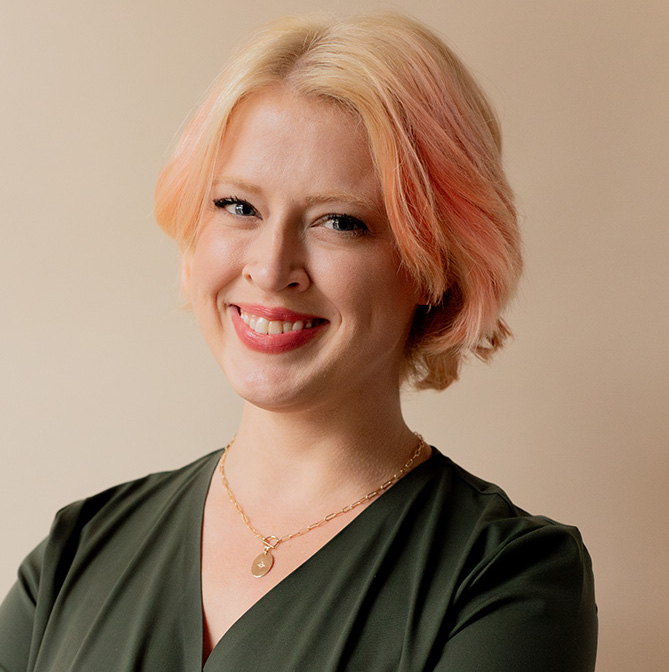
How To Talk About Sex With Friends (And Why We Should)
Let’s Talk About Sex
My adult friends and I can talk—and have talked—about nearly everything. But when it comes to sex, we revert to our prepubescent selves, giggling at every anatomical term. Or, we make jokes about it to mask our discomfort. Call it immature, or call it the product of a sex education that taught us little to nothing about the mechanics of sex. I like to think it’s the latter.
“Is it finally time to have ‘the talk’ with my friends?”
But lately, I’ve been wondering: Should I bring it up more often? Especially with the disruption and isolation of the past few years, where I know many of us are struggling with touch deprivation and physical intimacy (or lack thereof). Is it finally time for me to have “the talk” with my friends?
In the spirit of exploration, and because I wanted to know if it’s actually helpful to host conversations about sex with your platonic friends, I reached out to two experts. Here’s what I discovered:
Talking about sex frames up sexual norms
“A lot of us feel embarrassed about sexual desires, preferences, experiences, or struggles that are actually common, but we don’t learn how common they are until we talk about them!” says Suzannah Weiss, a feminist writer and journalist. It can also bring to light unaddressed concerns in our relationships, she notes. “Talking about sex can also teach us what’s not normal—that is if we’re not being treated right in the bedroom by our partners.”
Talking about sex broadens our perspective
Discussing sex “lets you hear more various points of view about sex (possibly including some people’s experiences and preferences)—and that, too, might open doors in your own sex life,” explains Carol Queen, sexologist and author of “The Sex & Pleasure Book.” She also points out that the more diverse experiences you share and learn from, the broader your worldview will be, even beyond the bedroom in our work and activist life.
Talking about sex solidifies our support network
Sexuality, even in 2022, can be isolating territory to navigate on your own. Queen reminds us that, when the conversations go well, discussing sex with friends gives you a sense of who will be an ally when you need it most.
But if you don’t have someone to talk to about everything under the sun (and under the sheets), you can seek community and conversation online. Sex Etc. is a great resource for teens, and Them, Blood + Milk, and Salty are excellent sites for people across the sexual spectrum. Perhaps you find community on Reddit—good for you! Just be cautious and protect yourself; Planned Parenthood offers resources for safely discussing your sexuality in person and online.
“I’m convinced!” you say. So how do we actually hold these discussions safely, respectfully, and without making awkward jokes? Here’s everything you need to get started.
1. Bringing up sex with your friends
Having “the talk” with your friends can be as simple as asking them in clear terms if you can discuss a sexual experience. Weiss suggests these questions as icebreakers, and using media as a vehicle for the discussion:
- “Could I get your advice on something that came up in my sex life?”
- “I was reading this article about incorporating toys into sex with a partner—have you ever tried that?”
- “Did you see that ‘Broad City’ episode about pegging?”
All of these conversations will vary based on your comfort level, closeness with the other person, and the depth of your relationship or type of sexual encounter. I love the opportunity to learn from my friends through these conversations, but I’ll forever be the last person to say, “Hey, let’s talk about doing it!” You might find that others are excited to talk about it—they just don’t know how to bring it up.
2. Getting consent to conversate
Before you dive into these conversations, get buy-in from your friends. Talking about sex without confirming that it’s comfortable for everyone involved can be triggering for people who have experienced sexual trauma or abuse. Ask your friend, “Is it okay if we talk about sex?”
Another helpful question to ask before holding deep conversations is, “Do you have the emotional bandwidth to discuss a heavy topic with me?” A friend asked me this once before a big conversation, and I’ve never forgotten how respected it made me feel.
“To be sex-positive doesn’t just mean seeing the positives about sexuality—it means respecting the diversity of it, and that includes people who are much more private or modest.”
— Carol Queen, Author and Sexologist
Make sure you’re clear on everyone’s comfort level. “To be sex-positive doesn’t just mean seeing the positives about sexuality—it means respecting the diversity of it, and that includes people who are much more private or modest,” notes Queen. Not everyone wants to talk about pegging, and that’s okay.
3. Setting boundaries
Once you’ve confirmed mutual comfort levels, you’ll still want to maintain boundaries. I’m good friends with the long-term partners of my besties—which is maybe why the topic doesn’t come up as often. We’re a tight-knit group of friends, so we’re more prone to protect intimate details and save the sex conversations for when there are larger health or relationship issues at hand.
“When talking about sex with friends, set boundaries and expectations.”
When talking about sex with friends, set boundaries and expectations of confidentiality so that each participant feels comfortable with the level of disclosure. You might even want to loop your partner in on what they’re comfortable sharing, if you want to respect their privacy.
Then, outline exactly what you want from the conversation. Weiss puts it best: “Let a friend know if there’s something you don’t want advice on; people sometimes assume that what works for them will work for others, but sometimes, you just want someone to listen.”
4. Choosing discussion topics
The bulk of my sex talks with friends have centered on our physical health—what’s normal, what’s not, and seriously, is this just an ingrown hair or what? But there’s value in discussing your sexual experiences, even if it’s just to have a laugh together about when things don’t go according to plan.
If you need more structure, Queen suggests selecting books or articles to read together and discuss in a book club format. (How great is that?) You can also listen to podcasts about sex and chat about your favorite episodes. Other things you can discuss include:
- Where your messages about sex and gender come from
- Books and movies that made you think about sex or gender issues
- Sex and sexuality in the context of social issues (LGBTQ rights, reproductive choices, and healthcare options)
- Positive experiences and new discoveries in your sex life
- Anything worrying you or causing you anxiety in the bedroom
- Self-pleasure habits and experiences you’re comfortable sharing, or your favorite sex toy recommendations
- How you work sex into a long-term relationship (Do you schedule sex? Or is there a great routine that works for you?)
Discussing practices you might think are common knowledge can mean more than you’d expect. For example, as my friend group became sexually active, we shared the “pee after sex” advice. I learned that lesson the hard way, but at least I was able to inform others.
5. Checking in after the conversation
“Even if your friend isn’t talking about it, they might still have more to say.”
After a heavy conversation, I always appreciate a good check-in, such as a quick, “How are you feeling about what we talked about last time? Would you like to talk about it some more?” Even if your friend isn’t talking about it, they might still have more to say.
When dealing with deeply emotional questions about sexual relationships, sexuality, or sexual health, remind your friends that you can revisit the conversation at any time. I let my BFFs know that we can have the same exact discussion a hundred times if it helps them, and I mean it.
Do you regularly talk to your friends about sex? How do you navigate boundaries during these conversations? Drop your thoughts in the comments below 👇
Emily Torres is the Editorial Director at The Good Trade. Born and raised in Indiana, she studied Creative Writing and Business at Indiana University. You can usually find her in her colorful Los Angeles apartment journaling, caring for her rabbits, or gaming.




